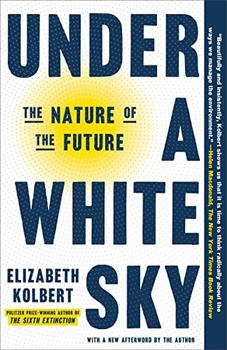Summary | Excerpt | Reviews | Beyond the book | Read-Alikes | Genres & Themes | Author Bio

The Nature of the Future
by Elizabeth KolbertYou can never go back home...so the saying goes. According to Pulitzer Prize-winning science writer Elizabeth Kolbert, that adage applies to the environment as well. She argues that Earth will never return to what it once was and to think any differently is potentially dangerous. The Earth is in a constant state of becoming; all we humans have to work with is the ecosystem of right now. We can try to manage future changes, but there's no going back.
This inconvenient truth is rejected by many environmentalists; it goes against their ideology of reducing waste. Contrary to the conventional environmental paradigm, which posits that the cessation of fossil fuel use and plastic pollution will help return our Earth to some type of "natural" equilibrium, Kolbert suggests there is no natural state to return to. The Earth is a dynamic, ever-evolving system. "Natural" and "idyllic" are both social constructions that have manifested in the public consciousness.
What is happening to the Earth today is natural, though unprecedented, in so much as humans are part of the natural environment and really making a mess of the place. The solution is not going to be found in striving for pre-industrial carbon levels and modes of consumption. Quite the opposite. To create and maintain an environment that we humans find optimal while sustaining more than nine billion people will require more technological innovation and risk taking. We've used technology to help the world sustain us. Now we need to use technology to help it continue to sustain us. There are few possible alternatives that wouldn't be calamitous for our species.
Kolbert deserves kudos for pointing out this new, likely unpopular reality. Her prize-winning book, The Sixth Great Extinction, largely focused on how humans may be dooming themselves by wantonly destroying the Earth's ecosystem. It was a frank and fair assessment. It would have been easy to follow it up with more of the same. She chose the path less traveled but definitely more enlightening. The current paradigm of rolling back carbon emissions and human consumption simply isn't working, and we are already past the point of no return. To prevent ecological collapse will require additional innovation in thinking — a near complete "paradigm shift" in how we imagine environmental management.
Each chapter in Under a White Sky presents a pertinent and unique example of using technology to combat environmental degradation. From the electrocution of fish in rural Illinois to slow their migration into the Great Lakes to digging up ice cores in tunnels deep beneath a Greenland glacier, Kolbert traverses the world to find scientists and entrepreneurs working to create a future ecosystem humans can be happy with. Perhaps the most memorable chapter, also available online in the January 18, 2021, issue of the New Yorker, concerns using gene-editing technology – CRISPR – to eliminate invasive species and pests. Scientists can easily change the color of an entire species these days with a simple kit. Perhaps more usefully, they can exterminate it. Should they?
Under a White Sky may prove unpopular among the most diehard environmentalists, but the science behind it is undeniable. Kolbert's Pulitzer-earning writing style shines through. She weaves together contemporary case studies of humans developing new technologies to fight back against technology-induced environmental disasters. The people she interviews are diverse and entertaining — from myriad scientists to a businessman trying to convince Americans to eat more carp. The technologies are innovative. For example, researchers in Australia are experimenting with genetically modifying an invasive species of frog so it no longer emits poison when attacked. This would allow predators to cull the frogs without hurting themselves. She also discusses the proposition of modifying the atmosphere to reduce greenhouse gases (with the potential side effect of turning the sky white).
Kolbert's narrative is informed and informative, and she doesn't avoid questioning the potential ethical dilemmas posed by these new innovations. Admittedly, gene editing and turning the sky bright white with sulfates, reducing the amount of sunlight reaching the Earth by two percent, could have unforeseen repercussions. However, as she presents ever-mounting evidence that current approaches for "saving the environment" simply don't work — in fact, have never worked — and other solutions exist, it's difficult not to be swayed. Maybe we should treat increasing carbon pollution more like big cities do sewage — inevitable but treatable.
Kolbert makes clear that we need to change our thinking about the environment. We can never go back home. With some technological updates, however, we can make our current home better than it is today.
![]() This review
first ran in the April 21, 2021
issue of BookBrowse Recommends.
This review
first ran in the April 21, 2021
issue of BookBrowse Recommends.

If you liked Under a White Sky, try these:

by Ferris Jabr
Published 2025
A vivid account of a major shift in how we understand Earth, from an exceptionally talented new voice. Earth is not simply an inanimate planet on which life evolved, but rather a planet that came to life.

by Rebecca Renner
Published 2024
David Grann meets Susan Orlean in this page-turning true story of an underground operation into the mysterious world of alligator poaching and its larger than life Floridian characters
Your guide toexceptional books
BookBrowse seeks out and recommends the best in contemporary fiction and nonfiction—books that not only engage and entertain but also deepen our understanding of ourselves and the world around us.